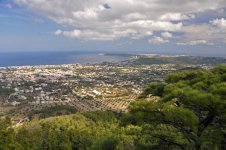An incidental disquisition about compound words whose components are nouns, like EarthQuake and LysAndros:
Inflected languages like Latin, ancient Greek, old English, etc., had the advantage, to avoid ambiguities and to make accurate translations, precisely by the use of grammatical endings or word alterations. E.g.,
"WordAlteration" = "alteration OF a word". "PhiloTheos" = "philos theOU", but then, when the compound noun was meant to be the name of a being, it was set in a NOMINATIVE form, that is, by suffixing -OS. (So, obviously the word coiners were also perspicacious linguists/semanticists of their own works.) "TheoPhilos" = "theou philos" [= I say: god's friend, god-befriended/loved], which, used as a name, does not need an alteration. However, this "philos" has an accusative/undergoing value or sense, which I tried to convey in my second translation. //
Speaking of "Ia-Lyss(os)", it is difficult to tell whether the second component has an agent/patient (active/passive) value. The use of a verbal noun, a past participle like PETOS in IAPETOS, leaves no doubt about its value [a passive/undergoing value], wherefore I translate it as "by Ya hurled, Ya-hurled, *Iadopetos?" rather than "hurling Ya". Fortunately a myth tells us that invading titans were hurled down from Mount Olympus. Apparently, the word Iapetos is < [from] *Iadopetos by an apochope [Ia( )petos]. [An Assumed Declination: Ias, *Iados (whence Iades; *Iadikos), etc.]




